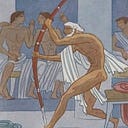SECOND, FIND THE WORDS
Words are the embodiment of thought.
In two senses: they are what puts thought into the material world (as sound, as image); and by being a certain way, by having certain qualities, it determines the order, the organization that the thought will have. The body makes possible the organization of the senses, it puts them in a certain place, the body gives them a form. Words determine, limit, and define thought. They are the vehicles we have.
The body analogy is useful because although we do not create or design the body we are, we can truly improve it in many ways. So with words.
The brevity of The Prince helps us see it like the patio of a house from its roof.
We have reviewed the first part, the map. The map is there, in the first paragraph of the work. There he points out the theme and goal of this text: what types of principalities there are and how to acquire them:
“All States, all domains that have exercised and continue to exercise sovereignty over men, have been and are republics or principalities. Principalities are hereditary or new. The new ones are either completely new, as Milan was under Francisco Sforza, or they are like added members to the hereditary State, as is the kingdom of Naples for the king of Spain. The dominions thus acquired are accustomed to live under a prince or to be free; and they are acquired by one’s own weapons or by those of others, by luck or by virtue.”
Communities are of two types: either principalities or republics. That is decisive because either they are used to being governed by a prince, or not. That is to say: obedience cannot be created in the same way in one gobern as in another. The last part of the quote tells us how they are acquired: either by virtue, or by luck, or by using other people’s weapons, or one’s own weapons.
Since we are clear about the map that Machiavelli has given us in the first paragraph of the work, we must begin to propose the index ourselves.
Because the author doesn’t.
The Prince is clearly divided into 26 chapters, each with a title. But what Machiavelli does not do is define the parts or sections, the great continents into which The Prince is structured. What is the first part of The Prince, how many and which chapters do it comprise? What is the second one? Are there two, four, parts? How many? What is the plan to advance the conquest of principalities and republics? He doesn’t say that.
Machiavelli trusts that the reader will be curious enough, he trusts that the topic interests him enough to start asking questions. Because in this way, hunting for the master parts of the text is how the reader will be able to better locate and guide himself in the text. Just as the body is divided into head, trunk and four limbs, two upper and two lower, we must be able to say into what large parts The Prince is divided.
We have the head: the types of principalities that exist, and get to know how they are acquired.
What words should we pay attention to, what keywords should we look for to rebuild the index that Machiavelli did not give us?
Next time we will answer how many and what the parts of The Prince are, but at this moment we leave it to the reader to search for them. Let’s use our hunting skills.
